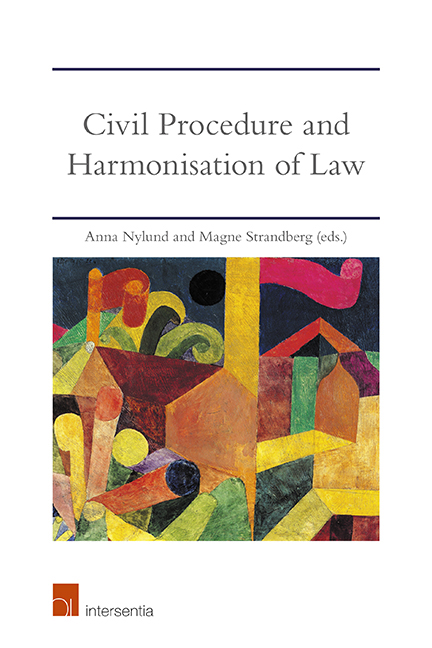Book contents
- Frontmatter
- Preface
- Contents
- List of Contributors
- List of Abbreviations
- Introduction
- EU Civil Justice at the Harmonisation Crossroads?
- The ELI-UNIDROIT Project: An Introduction and an English Perspective
- Europeanisation of Civil Procedure: Overcoming Follow-Up Fragmentation through Bottom-Up Harmonisation?
- Harmonisation or Fragmentation of National Law? An East Nordic Perspective
- An Examination of the Influence of European Union Law on English Civil Procedure
- The EU's Influence on Norwegian Civil Procedure through National Substantive Law
- Consumer Protection and EU-Driven Judicial Activism in the Netherlands
- The Role of the Judge in Consumer Cases – A German Perspective
- Ex Officio Application of the Unfair Terms Directive Cases against Consumers: A Swedish Perspective
- Ex Officio Application of EU Consumer Protection Law in Norwegian Courts
- Maintenance and Multi-Level Harmonisation: A European Union Perspective
- Family Maintenance and Multi-Speed Integration: A Norwegian Perspective
- Conclusions on Civil Procedure and Harmonisation of Law
- About the Editors
Consumer Protection and EU-Driven Judicial Activism in the Netherlands
Published online by Cambridge University Press: 30 March 2019
- Frontmatter
- Preface
- Contents
- List of Contributors
- List of Abbreviations
- Introduction
- EU Civil Justice at the Harmonisation Crossroads?
- The ELI-UNIDROIT Project: An Introduction and an English Perspective
- Europeanisation of Civil Procedure: Overcoming Follow-Up Fragmentation through Bottom-Up Harmonisation?
- Harmonisation or Fragmentation of National Law? An East Nordic Perspective
- An Examination of the Influence of European Union Law on English Civil Procedure
- The EU's Influence on Norwegian Civil Procedure through National Substantive Law
- Consumer Protection and EU-Driven Judicial Activism in the Netherlands
- The Role of the Judge in Consumer Cases – A German Perspective
- Ex Officio Application of the Unfair Terms Directive Cases against Consumers: A Swedish Perspective
- Ex Officio Application of EU Consumer Protection Law in Norwegian Courts
- Maintenance and Multi-Level Harmonisation: A European Union Perspective
- Family Maintenance and Multi-Speed Integration: A Norwegian Perspective
- Conclusions on Civil Procedure and Harmonisation of Law
- About the Editors
Summary
EU-DRIVEN JUDICIAL ACTIVISM
It is very likely that consumers are unaware of their rights in civil cases. Therefore, if a consumer is involved in a civil case before a court and is not represented by a legal professional, it is likely that he will not bring forward all the relevant legal aspects of the case. To take a simple example, say a company has delivered some form of good or service to a consumer and states aft erwards that it follows from its general terms that a consumer has to pay a certain additional amount. The consumer refuses to pay the additional amount. If the company starts civil proceedings and files a claim against the consumer before a civil court, it is far from certain that during these proceedings the consumer will raise the issue of whether the general term on which the claim is based is valid. The consumer may not be aware of his rights under the Unfair Terms Directive. The court may be aware of the fact that the claim is perhaps based on an unfair term, but that issue is not brought forward in court by one of the parties. Will the court apply national rules that are based on the Directive on unfair terms ex officio? If so, the court will decide ex officio whether the general term at issue is unfair or not.
The vast amount of case law of the European Court of Justice (ECJ) on ex officio application of EU law has not gone unnoticed by Dutch courts. On the contrary, the numerous decisions the ECJ has issued on this topic in the field of consumer protection are studied carefully and taken seriously by Dutch courts. Dutch courts try to comply with European case law on ex officio application of EU law, and there are many decisions on this topic by Dutch courts. Dutch courts are trying to fit this ECJ case law into the Dutch civil procedural system. The topic has several aspects and has led to several questions concerning the role of national (in this case Dutch) courts.
- Type
- Chapter
- Information
- Civil Procedure and Harmonisation of LawThe Dynamics of EU and International Treaties, pp. 125 - 140Publisher: IntersentiaPrint publication year: 2019



